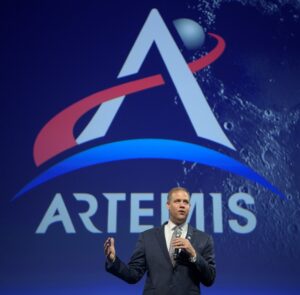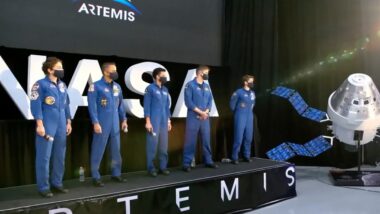On April 2, 1958, President Dwight D. Eisenhower called on Congress to form the National Aeronautics and Space Administration (NASA). The Soviet Union was succeeding in the space domain, and President Eisenhower knew it was imperative the United States win the space race or face severe national security consequences. Congress met that call 12 days later when both the Senate and House of Representatives introduced legislation that would create today’s NASA. Almost a decade after President Eisenhower made that initial call to action, Neil Armstrong was taking his giant leap for all mankind.
We have now entered a new space race for the moon and beyond. Russia and China have stepped into the arena, with both countries recently signing a memorandum of understanding to create a joint lunar space station.
Russia, which has been a long-standing partner with NASA on the International Space Station, sent a clear signal by creating an alliance with China for lunar exploration, rather than continuing its historical partnerships by joining with the United States and the rest of the international space community in a return to the moon.
China has recently made significant strides in its own space program. Last November, China launched its successful robotic Chang’e-5 mission, bringing back new samples from the moon, and while there, planted a Chinese flag showcasing the nation’s increasing capability in space. The return marked the first probe to bring back specimens from the moon since the Soviet Union’s Luna 24 mission in 1976.
We, as a nation, cannot simply revel in our past accomplishments in lunar exploration. Imagine the eerie scenario of China or Russia removing the American flag that Neil Armstrong and Buzz Aldrin planted on the moon in 1969 and returning it to Earth to use as propaganda to advance their own interests in the space race.
During their tenure, President Trump, Vice President Pence, and NASA Administrator Bridenstine laid the groundwork for the United States to remain the leader in the world’s space domain. We worked together to reestablish the National Space Council, witnessed the resurgence of American rockets, launched American astronauts from American soil using commercially provided launch vehicles, established the Space Force, and called for a new era of space exploration — the return to the moon through the Artemis program.
It is imperative we continue to build upon the foundation laid for Artemis, which will ultimately move us beyond returning to the moon, and on toward a goal of landing astronauts on Mars.
Last week, President Biden nominated former Sen. Bill Nelson to be the 14th NASA administrator. This nomination comes at a critical time, and Sen. Nelson is no stranger to Capitol Hill, NASA or even the Space Launch System. During his confirmation process, I expect Sen. Nelson to follow his own words that the NASA administrator should “not be political,” but instead be a “consummate space professional.” With roots spanning multiple administrations, Artemis will not survive if it is now cast as a partisan program. The science and engineering capabilities encapsulated within the Artemis program are supported on both sides of the aisle, and its goals will only be accomplished through a holistic and bipartisan approach. I also expect Sen. Nelson to show absolute support for Artemis by prioritizing the program in the administration’s budget request to the Senate Appropriations Committee.
I am a part of the Apollo generation, and I remember the bold visions from our leaders that produced incredible and heroic achievements that brought this country together and inspired 50 years of space exploration. Leaders again had set bold deadlines of landing Americans on the moon by 2024, and that goal has placed the United States ahead in the race to return astronauts to the moon. However, if we postpone and delay the Artemis mission to 2025, 2026 or even 2030, there is no doubt we will lose this space race to Russia and China.
It is time to inspire the Artemis generation. The new administration’s early statements regarding their support for Artemis and the direction of the program are encouraging, but words alone will not return us to the moon.
I echo President Eisenhower’s call to action and urge President Biden and Sen. Nelson to fully support the Artemis mission not only through words but action. I fear our nation’s leadership in space is in jeopardy if we do not.
U.S. Sen. Jerry Moran (R-Kans.) is the Ranking Member of the Senate Appropriations Commerce, Justice and Science Subcommittee that funds NASA serves on the Senate Commerce space and science subcommittee.




